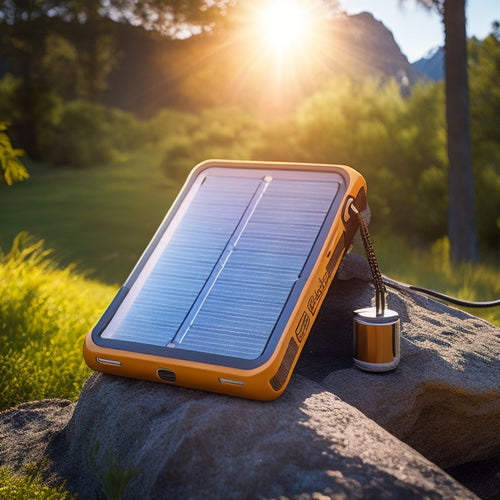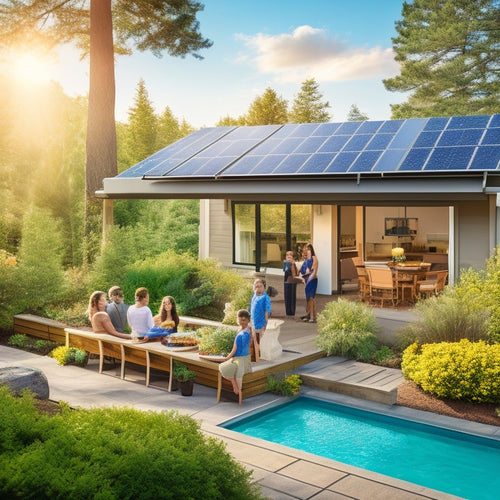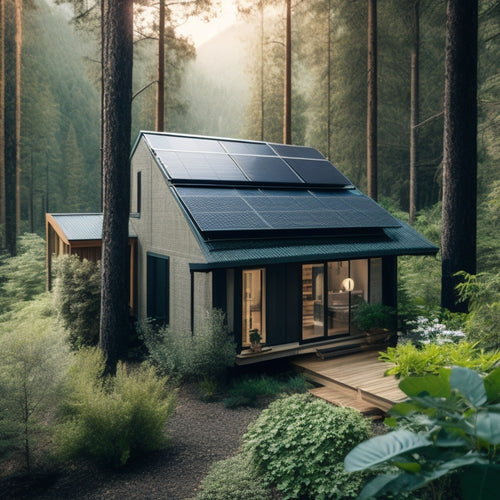
Solar Panel System Price
Share
You're likely considering a solar panel system to reduce your reliance on the grid and lower your electricity bills, but the initial investment cost is a key factor in your decision-making process. The cost of a solar panel system varies depending on factors like system size, installation complexity, and local incentives. On average, a residential solar panel system can cost between $15,000 and $30,000, although federal tax credits and state incentives can help offset the upfront cost. By understanding your energy consumption patterns and evaluating your daily energy requirements, you can optimize your system's performance and increase your return on investment - and that's just the beginning of your solar expedition.
The Essentials
- The cost of a solar panel system varies depending on factors like system size, quality, and installation company, with average prices ranging from $15,000 to $30,000.
- Federal tax credits and state incentives can significantly reduce the upfront cost of a solar panel system, making it more affordable for homeowners.
- Solar panel systems can save homeowners money on their energy bills, with average annual savings ranging from $400 to $1,000, depending on energy usage and system size.
- The cost per watt of a solar panel system can range from $2.50 to $3.50, depending on the quality of the equipment and installation company.
- While the initial investment in a solar panel system may seem high, it can pay for itself through energy savings and increased property value over time.
Save Money on Electricity
You can greatly reduce your energy bills by utilizing solar power.
By installing a solar panel system, you'll lower your reliance on the grid and decrease your electricity costs.
With a reliable and efficient supply of energy, you can break free from the grid and take control of your energy needs.
This translates to considerable savings over time, making your investment in solar energy a financially savvy decision.
Reduce Energy Bills
The primary motivation for many individuals to invest in a solar panel system is to reduce energy bills and save money on electricity. By utilizing the power of the sun, you can greatly lower your energy costs and enjoy long-term savings.
With a solar panel system, you'll generate free energy during the day, reducing your reliance on the grid and the amount you pay to your utility company. As many homeowners and outdoor enthusiasts are uncovering, renewable energy systems can provide a reliable source of power, whether at home or on the go.
By capitalizing on the sun's energy, you'll not only reduce your energy bills but also minimize your carbon footprint, contributing to a more sustainable future. You'll also benefit from solar incentives, such as the federal tax credit, which can help offset the initial cost of your system.
By reducing your energy bills, you'll gain energy independence and have more control over your finances. Imagine having extra money in your pocket each month, thanks to the clean energy produced by your solar panel system.
With the rising cost of traditional energy sources, investing in solar is a smart move for those looking to break free from the grid and take charge of their energy expenses.
Lower Your Costs
Solar panel systems offer a tangible way to lower your costs by saving money on electricity. By utilizing the power of the sun, you can reduce your reliance on traditional energy sources and enjoy significant savings on your electricity bills.
With a solar panel system, you can generate your own clean energy and feed any excess back into the grid, offsetting your energy consumption. By installing rooftop solar panels, you can increase your home's value and appeal, making it a more attractive selling point should you decide to move.
To maximize your savings, it's important to choose cost-effective solutions that fit your budget. Look for budget-friendly options such as tiered pricing structures or financing plans that can help spread the initial investment over time.
Additionally, consider the long-term benefits of solar energy, including increased property value and reduced maintenance costs.
Increased Property Value
You'll likely see an enhancement in market appeal when you install a solar panel system, making your property more attractive to potential buyers.
As homeowners become increasingly environmentally conscious, features like residential solar panels are becoming major selling points.
This increased appeal translates to a higher resale value, as eco-friendly features are highly sought after in today's real estate market.
Market Appeal Boost
Beyond the environmental benefits and cost savings, installing a solar panel system can greatly enhance your property's market appeal, making it more attractive to potential buyers if you decide to sell in the future.
This increase in appeal is largely driven by current market trends, which increasingly prioritize sustainable and eco-friendly features.
As consumer preferences shift towards environmentally responsible living, properties with solar panel systems become more desirable and precious.
Higher Resale Value
Installing a solar panel system can greatly enhance your property's resale value, as it becomes a highly sought-after feature in today's eco-conscious market.
According to recent resale trends, properties equipped with solar panels sell faster and at higher prices compared to those without. This increased demand translates to higher property values, making your investment in solar panels a lucrative one.
As a property owner, you'll reap the investment benefits of solar panels in the long run. Not only will you save on energy bills, but you'll also increase your property's appeal to potential buyers.
A study by the National Renewable Energy Laboratory found that solar panels can increase a property's value by up to $15,000. This added value can be a significant selling point, setting your property apart from others in the market.
Maximum Power Point Tracking
You'll want to guarantee your solar panel system maximizes energy harvesting by enhancing its power point tracking. This involves identifying the ideal voltage and current at which your panels operate, allowing you to convert sunlight into electrical energy efficiently.
For instance, a grid tie system can help improve energy production, while a deep cycle battery can store excess energy for later use Residential Solar Power. By doing so, you'll get the most out of your system, increasing its overall performance and reducing energy losses.
Optimizing Energy Harvesting
By virtue of their inherent variability, solar panels operate at maximum efficiency only under specific environmental conditions, necessitating the use of Maximum Power Point Tracking (MPPT) to enhance energy harvesting.
You'll want to guarantee your solar panel system is equipped with an MPPT controller to maximize energy production. This advanced technology continuously monitors and adjusts the system's operating conditions to ascertain the ideal energy output is achieved.
When it comes to energy optimization, MPPT plays a vital role in maximizing your solar panel system's performance. By tracking the maximum power point, you can increase your system's solar efficiency by up to 30%.
This results in more electricity generated from the same amount of sunlight, reducing your reliance on the grid and increasing your energy independence.
To get the most out of your solar panel system, you'll want to verify your MPPT controller is compatible with your specific system configuration.
Efficient Power Conversion
Most solar panel systems rely on efficient power conversion to maximize energy harvesting, and Maximum Power Point Tracking (MPPT) is an essential component in this process.
You'll find that MPPT enhances solar efficiency by continuously monitoring and adjusting the operating voltage of your solar panels to guarantee they're producing maximum power. This advanced energy technology enables your solar panel system to adapt to changing environmental conditions, such as temperature and irradiance, to achieve peak performance.
As you investigate the world of renewable solutions, you'll uncover that MPPT plays a critical role in power optimization. By tracking the maximum power point, your solar panel system can achieve higher conversion rates, resulting in more energy harvested and reduced energy waste.
This innovative approach to energy innovation has revolutionized the solar industry, enabling homeowners and businesses to reap the benefits of clean, sustainable energy. By integrating MPPT into your solar panel system, you'll be able to access the full potential of your panels, guaranteeing ideal panel performance and maximum energy output.
Assess Your Energy Consumption
You need to understand your energy usage patterns to determine your daily energy requirements. This involves analyzing your past electricity bills to identify peak usage hours and average daily consumption in kilowatt-hours (kWh).
To maximize your energy savings, it's crucial to contemplate investing in home energy storage systems that can store excess energy generated by your solar panel system for later use.
Energy Usage Patterns
Frequently, homeowners overlook the significance of understanding their energy usage patterns when considering a solar panel system installation. However, this understanding is essential in determining the right system size and configuration for your specific needs. Your energy demand and usage trends directly impact the performance and cost-effectiveness of your solar panel system.
To better understand your energy usage patterns, let's take a look at a breakdown of your daily energy consumption:
| Time of Day | Energy Consumption |
|---|---|
| Morning (6am-10am) | 20-30% |
| Day (10am-4pm) | 40-50% |
| Evening (4pm-8pm) | 20-30% |
| Night (8pm-10pm) | 10-20% |
| Night (10pm-6am) | 5-10% |
Daily Energy Requirements
To accurately size your solar panel system, it's essential to determine your daily energy requirements. This calculation is vital for energy demand forecasting, guaranteeing that your solar panel system can meet your energy needs.
Start by identifying your energy usage patterns, such as when you use the most energy during the day.
Next, calculate your total daily energy consumption in watt-hours (Wh). You can do this by multiplying the power rating of each appliance by the number of hours it's used daily.
Add up the total energy consumption of all your appliances, lights, and devices. This will give you your daily energy requirement.
For solar capacity planning, you'll need to take into account your energy requirements during peak sun hours. Typically, this is when the sun is at its strongest, between 9 am and 3 pm.
Higher Energy Conversion Rate
You want a solar panel system that efficiently harvests energy from the sun.
To achieve this, you need to focus on the energy conversion rate, which is the percentage of sunlight that's actually converted into usable electricity.
A higher energy conversion rate means you'll generate more power from the same amount of sunlight, making your system more cost-effective.
Efficient Energy Harvesting
Utilizing solar energy efficiently is vital to maximize the return on investment in a solar panel system. You want to guarantee that your system is optimized to generate the most power possible from the sun's energy. Efficient energy harvesting is essential to achieve this goal.
By focusing on solar efficiency, you can increase the amount of energy your system produces. This means selecting high-quality solar panels with high conversion rates, confirming proper installation and alignment, and maintaining your system regularly.
Energy optimization is also important, as it enables you to monitor and adjust your system's performance in real-time. This allows you to identify and address any issues promptly, minimizing energy losses and maximizing your returns.
Frequently Asked Questions
Can I Install Solar Panels on My Own?
You can attempt a DIY installation with solar panel kits, but beware: it requires extensive electrical knowledge, permits, and safety precautions; if you're not experienced, it's recommended to hire a certified professional to guarantee a safe and efficient installation.
Do Solar Panels Work During Power Outages?
While you're connected to the grid, you won't have power during outages, but with energy storage, you can achieve grid independence, allowing you to utilize solar energy even when the grid fails, giving you freedom from darkness.
Are Solar Panels Resistant to Extreme Weather?
You'll be relieved to know that solar panels are designed to withstand extreme weather conditions, boasting impressive weather durability and storm resistance, ensuring your freedom from grid reliance remains uninterrupted even in harsh environmental circumstances.
Can I Use Solar Panels for Heating Water?
Ah, you want to ditch those pesky water bills and go green? Yes, you can use solar panels for heating water! Solar water heating systems boast impressive efficiency, with some setups reaching up to 80% heating efficiency - a radiant way to warm up your freedom!
Do Solar Panels Require Regular Maintenance?
You'll find that solar panels require minimal maintenance, but regular checks can guarantee ideal performance and extend their longevity, keeping maintenance costs low, and giving you the freedom to enjoy clean energy without worrying about frequent repairs.
Final Thoughts
As you tap into the power of the sun, your wallet blooms like a flower in spring. The solar panel system price may seem steep, but it's a seed that yields a bountiful harvest of savings on electricity. Your property value soars like a bird taking flight, and maximum power point tracking guarantees every ray is employed. Assess your energy consumption, and watch your energy conversion rate skyrocket. With a solar panel system, the future is bright, and your savings are as clear as a sunny day.
Related Posts
-

Fastest Solar Chargers for Emergency Power
When choosing the fastest solar chargers for emergency power, you need to focus on features like rapid charging capab...
-

Top-Rated Home Solar Power Kits for Achieving Energy Independence
Top-rated home solar power kits enable you to achieve energy independence by greatly cutting your energy costs. You c...
-

Off Grid Solar Batteries
As you shift to off-grid living, you'll rely on high-performance solar batteries to store excess energy generated by ...


